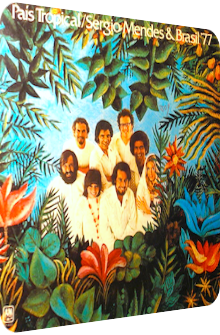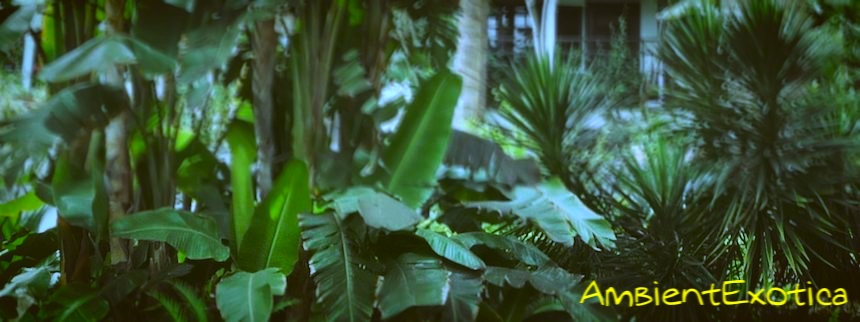
Sérgio Mendes
Pais Tropical
1971
Sérgio Mendes (born 1941) gathers his collective called Brasil ‘77, here comprising an undectet, in order to create a curious bonfire-compatible midtempo Exotica work of the Disco-esque, Funk-oid kind. The result is a work of nine renditions called País Tropical, released in 1971 on A & M Records and featuring the lead vocals of Gracinha Leporace and Karen Philipp as well as the jocular chants of many a male band member such as conguero Laudir Soares, drummers Jimmy Keltner and Claudio Slon, percussionist Rubens Bassini, saxophonist and orchestra leader Tom Scott whose orchestrated violins expand the silkiness of the backdrops, and guitarist Oscar C. Neves, among others. Despite the many percussion instrumentalists, the majority of the tracks, while featuring splendid textures, is comparably tame, no eclectic solos or particularly noteworthy intersections ever appear. The melody side, however, succeeds, that is if the listener is up for a post-Space-Age singsong with "la la lyrics" and vocals in both Portuguese and English.
Fans of James Last and his ditties of eternal bonds, never-ending beach parties and voodoo-themed extravaganzas are the target group, although to be fair, Sérgio Mendes’ vision is indeed notably paradisal, clearly rooted in Brazilian climes and featuring ethereal transfigurations of tropical panoramas. The presented material is all obscure even by Exotica standards, no golden classic reaches the ears of the listener. This is no problem at all, as it helps País Tropical to be a somewhat unique tidbit. Can Mendes and band unite Brazil with North America style-wise?
País Tropical is the gateway to the eponymous lush verdure and proves to be a splendid point of origin. Envisioned by Jorge Ben, bandleader Mendes wastes no time and instructs his ten Brasil ‘77 fellows to erect an aural rain forest of the densely layered kind. Sunny-bucolic rhythm piano chords form the base frame for Karen Philipp and Gracinha Leporace to unleash their Portuguese vocals in front of Laudir Soares’ bongo thicket. Oscar C. Neves’ wah-wah guitar boosts the funkiness, all the while the chorus is realized by the remaining band members, creating a bonfire gathering that would make James Last proud due to its striking similarity to his uniting singalong artifacts. Plinking tambourines and Tom Scott’s glowing tenor saxophone complete the euphonious midtempo ditty of comradeship and amity. Roger Nichols’ and Paul Williams’ So Many People could not carry a more poignant title after the choir-heavy opener. Its downtempo nature, harmonica coils and whispering female chants make it a more mysterious-sleazy critter, with Tom Scott’s orchestral violins and harp cascades adding a strong flamboyance to the vibraphone-accentuated brass rivers that float along the pristine glistening dreamscape.
Milton Nascimento‘s Morro Velho keeps on residing in these easygoing tempo ranges and feels very much like a lachrymose closer, with the ladies’ vocals encapsulated in deep brass layers, polyphonous flute washes and an ethereal string greenery. The percussion is comparably tame – or is it lame? – and exclusively serves the majesty of the melodies. Only the chorus interweaves sizzling maracas and the lively staccato on a drum kit; the rest, however, is all too easy. A percussive eclecticism would not have hurt the moony aurora. Since the catchiness of the orchestra strings and the guitar layers is so utterly wraithlike and purified, Morro Velho remains an iridescent gem in the end. The fourth track is already the closer of side A: Edú Lobo’s Zanzibar is the much needed corker of five minutes, supercharged with rustically hammering piano stabs, endless sequences of evocative bad-da-da lyrics and vertiginously energetic classic drums. Traces of pentatonicism as well as gorgeous instrumental segues of the moving, fast-paced kinds transform Zanzibar into a life-like jungle that leaves as much room for Carl Radle’s bass guitar as for juicy guitar chords. A resplendent piece of escapism.
Side B kicks off with the aural location called Tonga. Originally written by Antonio Pecci Filho aka Toquinho and Vínicius De Moraes, Sérgio Mendes’ crew revs up the Brazilian spirit of this Bossa Nova by means of sun-dried acoustic guitar groundings, delicate caixhas and large-grained maraca shakers, la la la chants by the mixed choir and aqueous piano sprinkles. The fissured structure makes it possible for each texture to shine. While Paul Williams’ Gone Forever is an audacious schmaltzcapade of chintzy English lyrics, saccharine violins and sugar-coated wind chimes which are again very James Last-like and not even the slightest bit exotic, the following Asa Branca by Luiz Gonzaga is a tad better thanks to its immediate rhythm-and-beat structure as well as its ingenious la la lyrics, but otherwise functions as yet another clap-together anthem with a distant Gospel spirit. Roger Nichols’ and Paul Williams’ second piece of the album, called I Know You, is beautifully arranged by Mendes, with enchanting string spirals, benign flute airflows as well as silkened brass layers in tandem with the rising glissando of harps, but unfortunately sees its impact lessened by all too smarmy male vocals. Notwithstanding this tendency, it remains a lovely string-heavy dreamscape, with J. J. Cale’s closer After Midnight bursting at the seams with tempo-shifting breakneck rhythms, concrete jungle brass layers and a gigantic show tune-evoking solemnity. A bubbling closer that finally exposes the horns and puts them into the limelight, and not a moment too late.
A double-edged sword oscillating between exotic rain forests and hippie gatherings at campfire sites, País Tropical is not exclusively tropical, but paradisal enough to integrate it from time to time in a well-balanced Exotica playlist. The feeling of togetherness and friendship is all over the album, no shady cloud is in sight. For my taste, there are too few uptempo tunes included. The titular País Tropical and Zanzibar are good examples, but the remaining material unfortunately relies on slower rhythms. The intertwinement of Tom Scott’s orchestra usually works, sometimes even magically so, especially in I Know You; in addition, the soothing brass layers accentuate the majority of the tracks splendidly too, but a truly absorbing enchantment does not build up.
The percussion hardly kindles excitement, for it most often keeps a laid-back rhythm alive. Without belittling País Tropical any further, it has its great peculiarities, be it the focus on vocals and lyrics in both Portuguese and English, the first foreshadowing particles of sleazy proto-Funk and upcoming Disco dioramas or the aforementioned bond of being together in the tropical country of Brazil. Fans of James Last might want to give this record a spin, but then again, their beloved composer of swinging numbers and badger paroles suits their needs better than Sérgio Mendes ever could. País Tropical is available on LP, CD and digital download versions. Better pre-listen to the tracks and be cautious, for this is no vintage Exotica album due to the publishing year alone, but can undoubtedly be placed in the outer rims of the genre.
Exotica Review 275: Sergio Mendes – País Tropical (1971). Originally published on Oct. 26, 2013 at AmbientExotica.com.
